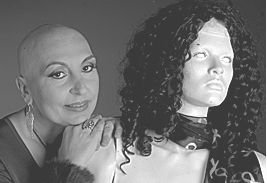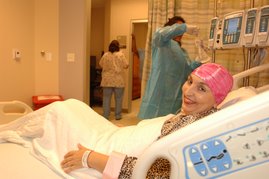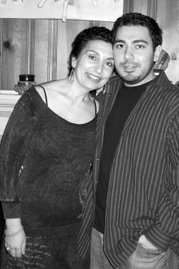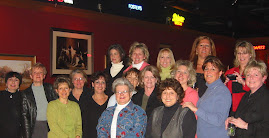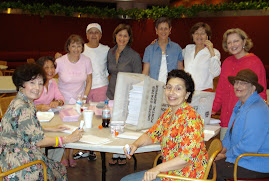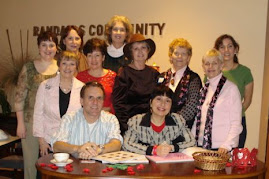A sprinkling of happiness to one and all, combined with a pinch of smiles and dash of big hugs! I call that my "Welcome Recipe." There's more where that came from, so dig in, eat up and by all means, please kiss the chef!
"Nothing would be more tiresome than eating and drinking if God had not made them a pleasure as well as a necessity."-Voltaire
While the Pink Crusader is cooking up something special in life's kitchen, good friend and fellow survivor Cheryl P. Donlin has graciously stepped in as this week's guest writer. Cheryl writes:
Hope
Since my breast cancer diagnosis two years ago, I’ve attended a lot of cancer-related events and interacted with lots of people who are battling cancer in many forms and degrees. I always come away from these encounters refreshed and struck by the overwhelming sense of optimism and, yes, I’ll say it, hope, radiating from the people I’ve met. I say hope somewhat reluctantly because in the wear and tear of everyday experience, the word “hope” is often overused or used in an essentially negative way -- as in, there’s always hope ... when all else fails, implied. Or the implication is that hope is a static, all-or-nothing thing, something you either have or don’t have, depending on the latest test results.
In the time since my diagnosis and treatment, it’s something I’ve heard many times: don’t lose hope, hope for the best, there’s always hope; but there was always something troubling to me about these statements. Troubling because I wasn’t sure if they were a command, a wish, or an affirmation. Troubling because I couldn’t place my finger on just what hope is really all about, and just what a cancer survivor’s relationship to it could or should be. Do we, indeed, manufacture hope to fill the void, and can we give it to others, or is there more to it?
The Universe has an uncanny way of providing what we need when we need it. So, why was I surprised to find, as I sat in a doctor’s noisy office, flipping through one of those aged, tattered magazines that seem to populate waiting rooms everywhere, an article on hope? This article, written by Rev. Mary Martha Thiel, a chaplain educator at Beverly Hospital in Beverly, Massachusetts, reached right into my heart and mind, righted my perspective on hope and gave new life to the word.
In her take on hope, Rev. Thiel sees it as a dynamic, adaptable state of mind and spirit that is often evoked by serious challenges in life, such as a cancer diagnosis. Far from being a static thing, she sees hope as constantly evolving, changing to meet changing needs. In this scenario, when we let go of one hope (or mindset about our circumstances at a particular point in our lives), we open our minds and hearts to another that better fits the new circumstances we find ourselves in.
This kind of hope is indeed a powerful spiritual force that can transform how we perceive where we are on life’s journey and the ways in which we can move forward on paths that have taken unexpected turns. When we give up our preconceptions of what hope looks like, and learn to ask the right question: not “dare we hope?” or “is there hope?” but rather, “what would hope look like for me, right now, in this situation?”, then we will have embraced true hope. This hope will be ours and ours alone, perfectly shaped for our present need.
At the moment of divergence, when we’re knocked off the path we’re on and find ourselves disoriented and stumbling down a seemingly darker path, hope may seem to flicker and falter, even to die out. It is at that moment that the real work begins; and what thing worth its salt does not require work on our part? The work of reshaping hope begins with an honest assessment of the change that’s occurred in our life, its likely consequences, and a good-faith evaluation of what we need hope to be for us now. This can be a scary proposition; it is not just a rational process, but one that taps into all of our deepest personal resources: mental, spiritual, and emotional.
If we are honest with ourselves, we will discover that hope has not died out at all; it has merely morphed into a new shape, one that answers more perfectly to the newly-expressed need. What a powerful transformative process we are part of when we accept hope both for what it is and what it is not. It is a way to reach deep into our spiritual powers and enrich our journey along our path, wherever that path takes us. It is not a social convention or the pale reflection of nothing left to say.
When hope emerges from within us and is not imposed from the outside, then it is comprised of unshakable strength, spiritual power and control over our own needs. Then, yes, in the fullest and most personal sense, we can truly say there is always hope. And this kind of hope is what radiates, illuminates and inspires each of us to reach deep within ourselves to find our own best hope. Thank you Rev. Thiel, and thank you all my sisters in breast cancer for your shining examples.
Courtesy of Coping® magazine, www.copingmag.com
NOTE from Cheryl: Josie, I have ordered reprints of Rev. Mary Martha Thiel’s 2006 article, Cultivating Hope, from Coping with Cancer magazine. If any of your readers are interested in getting a copy, they can contact me at cdonlin@tejaslabs.net, provide a mailing address, and I will be happy to send a copy to them. Cpd
Personal Note:
Thanks, Cheryl. Good food for thought. As always, it is such a joy to feature your written contributions in our weekly online column. We appreciate your insight and thoughtfulness that is penned into each and every word. We also thank Coping with Cancer Magazine for permission to reprint portions of the article.
FYI:
From Linda Mathews
Remember this motto to live by: Life should NOT be a journey to the grave with the intention of arriving safely in an attractive and well preserved body, but rather to skid in sideways, chocolate in one hand, wine in the other, body thoroughly used up,totally worn out and screaming "WOO HOO what a ride!" - Unknown
From Donna Fong
Josie, this is an excellent website for all bc survivors with lots of conferences you can tap into via live phone or e-mail. Thought you may want to include this into your site. HealthTalk (healthtalk@healthtalk.com)
From Cheryl Donlin
Breast cancer genes can come from father
By CARLA K. JOHNSON
CHICAGO — A deadly gene's path can hide in a family tree when a woman
has few aunts and older sisters, making it appear that her breast
cancer struck out of nowhere when it really came from Dad.
A new study suggests thousands of young women with breast cancer — an
estimated 8,000 a year in the U.S. — aren't offered testing to identify
faulty genes and clarify their medical decisions.
Guidelines used by insurance companies to decide coverage for genetic
testing should change to reflect the findings, said study co-author Dr.
Jeffrey Weitzel of City of Hope Cancer Center in Duarte, Calif. Testing
can cost more than $3,000.
"Interestingly, it's about Dad," Weitzel said. Half of genetic breast
cancers are inherited from a woman's father, not her mother. But unless
Dad has female relatives with breast cancer, the faulty gene may have
been passed down silently, without causing cancer. (Men can get genetic
breast cancer, too, but it's not common.)
Weitzel said doctors often overlook the genetic risk from the father's
side of the family.
The study, appearing in today's Journal of the American Medical
Association, looked at the genetic test results from 306 women
diagnosed with breast cancer before age 50.
None of the cancer patients in the study had a family history of breast
or ovarian cancer.
Among the women with plenty of female relatives, about 5 percent had
BRCA gene mutations. But among those with few sisters and aunts older
than 45 (when breast cancer would be likely to appear), almost 14
percent had mutations of the genes BRCA1 or BRCA2. That suggests that
these cancer patients were unaware of their genetic mutations because
there were so few women in the family to signal a cancer risk.
The researchers defined few female relatives as fewer than two on
either the father's or mother's side of the family.
Women who were adopted and don't know their family medical history
should be aware of the findings, Weitzel said. Women whose female
relatives died young before breast cancer had time to show up also are
affected.
When such a woman gets breast cancer before age 50, she should get a
genetic test, said Dr. Noah Kauff, a cancer geneticist at Memorial
Sloan-Kettering Cancer Center in New York. That would help her decide
whether to have the unaffected breast or her ovaries removed to prevent
more cancer. Kauff was not involved in the research, but wrote an
accompanying editorial.
"The study allows physicians and patients to make an argument to
insurance carriers that, although there's not a family history of
breast cancer, it's still reasonable to test and it should be a covered
benefit," Kauff said.
Genetic testing helps a woman choose her next medical steps. A woman
with breast cancer who has a BRCA gene mutation has a four times
greater risk of developing cancer in the other breast and a 10 times
greater risk of ovarian cancer than does a woman with breast cancer who
has no BRCA gene mutation.
Some women with a family history of breast cancer choose to have a BRCA
genetic test so they can decide whether to reduce their cancer risk by
removing their ovaries and breasts before any cancer appears. Drug
therapy and monitoring with annual MRI tests offer alternatives.
Testing the genes of more women would cost more money, but Weitzel said
that won't add significantly to health care costs and will prevent
cancer in some of the women.
The study also showed that three commonly used predictive models don't
accurately estimate the genetic breast cancer risk for women without a
family history of cancer. The American Cancer Society recently based
its recommendation for annual MRIs on risk assessments from the
predictive models. On the Net: JAMA: http://jama.ama-assn.org
Brought to you by the HoustonChronicle.com
http://www.chron.com/disp/story.mpl/headline/nation/4904754.html
DAILY REMINDER:
"Fund Free Mammograms"
IMPORTANT!!!!!6 MILLION CLICKS IN JUNE = $20,000 MORE FOR FREE MAMMOGRAMS There are just 5 days left and we've achieved only 71% of the six million
clicks needed. Please click today!
Go to The Breast Cancer Site at http://www.thebreastcancersite.com/tpc/EEB_0115_BCSm
and help fund free mammograms for the homeless, working-poor, and un-insured women. It costs nothing to you, except one daily click on the pink "Fund Free Mammograms" button. You can even request automatic reminders via e-mail. Please make your free click now, and thanks for your continuing support! The Breast Cancer Site, One Union Square, 600 University Street, Suite 1000, Seattle, WA 98101
Phone: 1-888-811-5271
UPCOMING EVENTS: Mark Your Calendars and Save the Dates!
ROSEBUDS II MEETINGS
(For those who have had or are at high risk for recurrence
and/or metastasis)
2nd and 4th Thursday of each month 5:45 - 7:30 p.m.
JUNE 28 JULY 12 & 26 AUGUST 9 & 23
SEPTEMBER 13 & 27 www.RosebudsSupport.org
You are cordially invited to attend an accredited educational program this Saturday!
Advances in Care: Improving Quality of Life for the Breast Cancer Patient
A 2-credit CE program for PHYSICIANS, NURSES and PHARMACISTS
Saturday, June 30, 2007, The Hotel ZaZa – Houston, TX
8:00 AM – 10: 15 AM
This program is FREE to all participants and complimentary breakfast will be served
Presenting Faculty:
Anthony Lucci, MD, M.D. Anderson Cancer Center, Houston, TX
Larry Driver, MD, M.D. Anderson Cancer Center, Houston, TX
David Baribeault, RPh, Boston Medical Center, Boston, MA
Theresa Birmingham, RN, Boston Medical Center, Boston, MA
TO REGISTER: Please call (888) 651.1944 or email annat@ihponline.net
ROSEBUDS MEETINGS
Open to all Breast Cancer Patients/Survivors
1st and 3rd Tuesday of each month 5:45 - 7:30 p.m.
JULY 3 & 17 AUGUST 7 & 21 SEPTEMBER 4 & 18
The Alice Thomsen Lymphedema Awareness Group of Houston
Meetings are scheduled on the 3rd Tuesday of every other month at the American cancer Society Building,6301 Richmond (between Hillcroft and Fountainview) at 7:00pm. The 2007 dates are July 17th, September 18 and November 20th.
For further information call 281-546-6438.
2007 Komen Survivor Party
August 22, at The Houstonian
Details to be announced in future posts.
"The Faces behind Breast Cancer" Launch Party
Sunday August 26, at 1:00 pm.
Marriott Westchase, Houston
Details posted in May 27th blog and web site www.pinkcrusader.org
Living Fully with and Beyond Cancer
M.D. Anderson Network's 19th Annual Patient and Caregiver Conference
September 6-8 2007 Registration begins June 11
Marriott Westchase - Houston, Texas
For more info call 1-800-345-6324 or visit www.mdanderson.org/patientconference
Tour De Pink 2007
Pink Ribbons Project
September 9, 2007
at Prairie View A&M University
www.tourdepink.org
2007 Breast Health Summit
"SAVE THE DATE" for the 2007 Breast Health Summit to be held on October 18, 2007 at the United Way in Houston. Please pass this information on to others who may be interested. Additional information will be sent out later by both e-mail and postal mail. And of course, if your mailing address has changed, please be sure to forward the updated information to me. I look forward to seeing you in October!
Pat Dames
The Rose-
12700 North Featherwood
Houston, TX 77034
281-464-5150
Fax 281-484-7083
pdames@the-rose.org
www.the-rose.org
"Sharing is Caring"
As always, The Pink Crusader welcomes your comments, stories, poems, and events. Posts are updated every Sunday. Please send your written contributions to thepinkcrusader1@aol.com.
"Just Give Me Chocolate and Nobody Gets Hurt."-Unknown
Until next week, stay strong, stay well, and keep on dancing
around the picnic table!


Love, Josie
The Pink Crusader
thepinkcrusader1@aol.com






